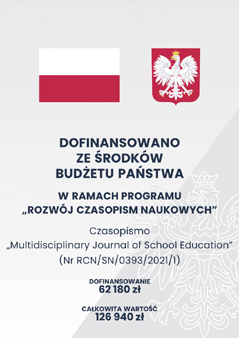Moral education and literature: the contribution of utopias and tales
Abstract
Since the beginning of Western culture utopias and tales have been involved within moral education. The contribution aims to make clear that this kind of literature is suitable from the pedagogical point of view principally because of the symbolic communicative style. It is important to be aware of the difference between ancient and modern utopias too.
References
Aristotle. 2002. Nicomachean Ethics. Oxford: Oxford University Press.
Aristotle. 1943. Generation of animals. Harvard: Harvard University Press.
Aristotle. 1998. Metaphysics. London: Penguin.
Bacon, Francis. 1963. Novum organum or true suggestions for the interpretation of nature. London: Routledge.
Cassirer, Ernst. 1953. The philosophy of symbolic forms. New Haven: Yale University Press.
Clement of Alexandria. 1954. Christ. The Educator. Washington, DC: Catholic University of America Press
More, Thomas. 2009. Utopia. London: Penguin
Plato. 2006. Republic. New Haven: Yale University Press.
Plato. 1986. Letter VII. London: Penguin.
Rousseau, Jean-Jacques. 1983. Emile. London: Grant and Cutler.
Rousseau, Jean-Jacques. 1992. Discourse on the origin of inequality. Indianapolis: Hackett Pub.Co.
Rousseau, Jean-Jacques. 1953. The confessions. London: Penguin

This work is licensed under a Creative Commons Attribution-NoDerivatives 4.0 International License.
- The Author/Authors agree(s) to publish the article free of charge in Multidisciplinary Journal of School Education in English or Spanish. The Editorial Board reserves the right to shorten the texts and change the titles.
- As part of free publication mentioned in § 1, the Author/Authors agrees to make the full electronic version of their article available in the Internet.
- The Author/Authors agrees to index their article in databases at home and abroad, including abstracts and keywords as well as Author's/Authors’ affiliation in English and in other languages. The Author/Authors agrees to pass on the information mentioned above to the owners of these databases.
- The Author/Authors declares that their publication is original and does not include borrowings from other works which might cause Publisher's responsibility, does not infringe the rights of the third party and that their copyright on this publication is not limited. The Author/Authors will incur all the costs and will pay compensations which might result from the mendacity of the following statement.
- The Author/Authors declares to bear complete responsibility for the scientific reliability of the article submitted. The detailed contribution of all co-authors is defined.
- The Author/Authors declares to publish the text in the Multidisciplinary Journal of School Education under a Creative Commons Attribution-NoDerivatives 4.0 International License (CC BY-ND 4.0).
- For more than one author, please complete the Authorship Contributions and send it to the editorial office. Please indicate the specific contributions made by each author (list the authors’ initials, e.g., JKH). Please download, complete, scan and attach the file in the system during the submission process.
Authors Statement - Authorship Contributions






